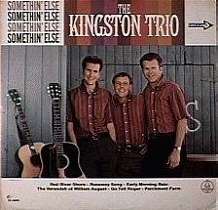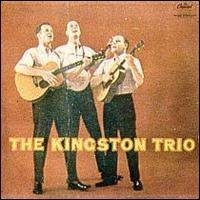
The Kingston Trio is the Kingston Trio's debut album, released in 1958. It entered the album charts in late October 1958, where it resided for nearly four years, spending one week at #1 in early 1959. It was awarded an RIAA gold album on January 19, 1961.
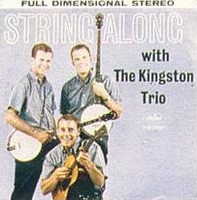
String Along is an album by the Kingston Trio, released in 1960. It was their fifth studio album in a row to reach number one on the Billboard charts and remained there for ten weeks. String Along received an RIAA gold certification in 1962, a year after Dave Guard had left the group. It was the last LP of the Trio to reach the number one spot. Two singles, "Bad Man's Blunder" b/w "The Escape of Old John Webb" and "Everglades" b/w "This Mornin', This Evenin', So Soon", were released. Both were the last singles of the "Guard years" Trio to chart, "Bad Man Blunder" the last to reach the Top 40.
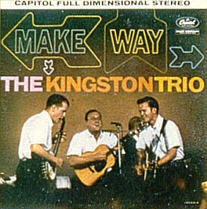
Make Way is the ninth album by the American folk music group the Kingston Trio, released in 1961. It reached number two on the Billboard charts, despite there being no US singles released from the album..

The Kingston Trio: The Guard Years is a compilation of The Kingston Trio's recordings when Dave Guard was a member of the Trio along with Bob Shane and Nick Reynolds.
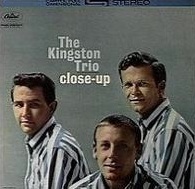
Close-Up is the eleventh album by the American folk music group the Kingston Trio, released in 1961. It was the first release by the group after the departure of founding member Dave Guard. The Trio now consisted of Bob Shane, Nick Reynolds and Guard's replacement John Stewart. Close-Up peaked at number three on the Billboard charts. The lead-off single was "Coming from the Mountains" backed with a non-LP track, "Nothing More to Look Forward To". Close-Up was nominated for a Grammy award in 1961 for Best Performance by a Vocal Group.

College Concert is the twelfth album by the American folk music group the Kingston Trio, released in 1962. It was the group's third live release and the first live release with new member John Stewart. College Concert peaked at number three on the Billboard charts and was the largest-selling release by the Stewart-years Trio.

Something Special is an album by the American folk music group the Kingston Trio, released in 1962. It reached number 7 on the Billboard Pop Albums chart. The lead-off single was a non-album track "C'mon Betty Home" b/w "Old Joe Clark". "One More Town" b/w "She Was Too Good to Me" was released as a single later the same year. Neither single made the Top 40. Something Special was nominated for a Grammy Award in the Best Folk Recording category.

New Frontier is an album by the American folk music group the Kingston Trio, their third album released in 1962. It reached number 16 on the Billboard Pop Albums chart. The lead-off single was "Greenback Dollar" b/w "New Frontier".

The Kingston Trio #16 is an album by the American folk music group the Kingston Trio, released in 1963. It reached number 4 on the Billboard Pop Albums chart. The lead-off single was "Reverend Mr. Black" b/w "One More Round", reaching number 8.

Sunny Side! is an album by the American folk music group the Kingston Trio, released in 1963. It reached number 7 on the Billboard Pop Albums chart. The lead-off single was "Desert Pete" b/w "Ballad of the Thresher". The single was the last Top 40 single for the group. Members of the Western Writers of America chose it as one of the Top 100 Western songs of all time.

Time to Think is an album by the American folk music group the Kingston Trio, released in 1963. It reached number 18 on the Billboard Pop Albums chart, only the third of the Trio's fifteen albums released since 1958 not to reach the top ten. The lead-off single was "Ally Ally Oxen Free" b/w "Marcelle Vahine", released in November 1963. Two more singles were released from the album in 1964 — "Last Night I Had the Strangest Dream" b/w "The Patriot Game" and "Seasons in the Sun" b/w "If You Don't Look Around", the latter the final single the trio would release on the Capitol label.

Back in Town is a live album by the American folk music group the Kingston Trio, released in 1964. It reached number 22 on the Billboard Pop Albums chart and is the final principal album recorded by the Trio for Capitol Records. The Trio's seven-year contract with Capitol ended in February 1964 with one album due. Unable to negotiate another contract, the group released this live album and moved to Decca Records.
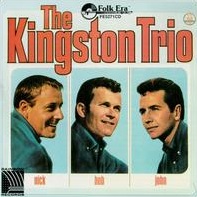
The Kingston Trio is an album by the American folk music group the Kingston Trio, released in 1964. Nick Bob John failed to reach the Top 40, peaking at number 53 on the Billboard Pop Albums chart.
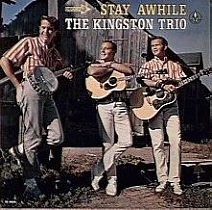
Stay Awhile is an album by the American folk music group the Kingston Trio, released in 1965. It was their second release on the Decca label. It continued their downward slide in the charts, reaching number 126 on the Billboard Pop Albums chart. The single "Yes I Can Feel It" b/w "Stay Awhile" did not chart.

Children of the Morning is an album by the American folk music group the Kingston Trio, released in 1966. It was their last album on the Decca label. Three singles were released from the album and all were commercial flops, as was the album. The singles were: "Norwegian Wood" b/w "Put Your Money Away", "The Spinnin' of the World" b/w "A Little Soul is Born" and "Lock All the Windows" b/w "Hit and Run".
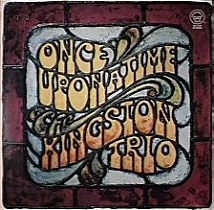
Once Upon a Time is a live album by the American folk music group the Kingston Trio, recorded in 1966 and released in 1969. It was originally released as a double-LP with a three-page booklet and reached number 163 on the Billboard Pop Albums chart. The lead-off single was "One Too Many Mornings" b/w "Scotch and Soda".

The Best of the Decca Years is a compilation of The Kingston Trio's recordings when the group was on the Decca Records label.

The Decca Years is a compilation of The Kingston Trio's four albums recorded for the Decca Records label. Folk Era had previously reissued The Kingston Trio , Stay Awhile and Children of the Morning, each including tracks from Somethin' Else as bonus tracks. They are presented here in the same song order as the reissues.

An Evening with The Kingston Trio is a live album by the American folk music group the Kingston Trio, recorded in 1962 and released in 1994. At the time of the performance, the group consisted of Bob Shane, Nick Reynolds, and John Stewart.

Live at the Crazy Horse is a live album by the American folk music group the Kingston Trio, released in 1994. The group consisted of the line up of Bob Shane, George Grove, and Nick Reynolds. Reynolds had left the group in 1967 and returned in 1988.
